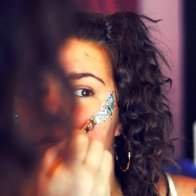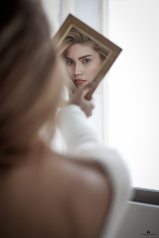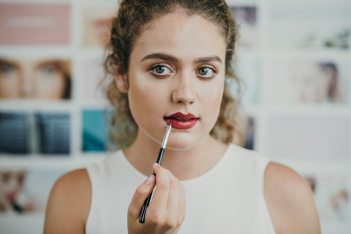From the soot-rimmed eyes of the ancient Egyptians to the lead paint worn by the Elizabethans, women and girls have experimented with cosmetics throughout history. Indeed, according to the Roman playwright Plautus, “a woman without paint is like food without salt”. Shakespeare’s Hamlet was less keen but just as rude, telling Ophelia: “I’ve heard all about you women and your cosmetics too. God gives you one face, but you paint another on top of it…”.
 So is makeup necessary seasoning, a conniving ploy by manipulative sexpots, or neither? Ask a group of women why they wear makeup and you’ll receive myriad responses. Some will say it makes them feel more confident, that they don’t feel completely “done” without it; others will say they love experimenting with looks and colours as a way of expressing themselves, that there’s a fun, theatrical element to face paint that allows them to channel different personalities and aesthetics.
So is makeup necessary seasoning, a conniving ploy by manipulative sexpots, or neither? Ask a group of women why they wear makeup and you’ll receive myriad responses. Some will say it makes them feel more confident, that they don’t feel completely “done” without it; others will say they love experimenting with looks and colours as a way of expressing themselves, that there’s a fun, theatrical element to face paint that allows them to channel different personalities and aesthetics.
But just as there are women and girls who wear makeup completely for themselves, there are those who wear makeup for the perceived benefit of others, or who feel as though they are unacceptable without it. Makeup can be a mask you hide behind that gets you ready to face the world, or something you deploy as a weapon – to attract a partner, to intimidate, shock and amaze. It is used as part of religious or cultural rituals, or to align yourself with a subculture. It can mask your insecurities or be used to enhance the bits you love the most.
 Makeup is so ubiquitous in our society that for a woman to go without it has become, in some cases, a statement – the “no makeup selfie” being a case in point. Makeup is especilly important for female celebrities that you can find on covers of many fashion magazines. Some will say there’s a fun, theatrical element to face paint that allows them to channel different personalities and aesthetics.
Makeup is so ubiquitous in our society that for a woman to go without it has become, in some cases, a statement – the “no makeup selfie” being a case in point. Makeup is especilly important for female celebrities that you can find on covers of many fashion magazines. Some will say there’s a fun, theatrical element to face paint that allows them to channel different personalities and aesthetics.
 Women receive messages from an early age that encourage us to believe that one of our primary functions is to be decorative and therefore appealing to men. Go into any newsagent and you’ll see little girls’ magazines that come with free gifts of lipgloss and nail varnish. Parents buy their daughters strange, disembodied dolls’ heads to practise on. The Disney princesses so many little girls model themselves on wear eyeliner, mascara and eyeshadow, and have perfectly plucked eyebrows. Considering the extent to which makeup is viewed as a process of adornment used for attracting a mate, to foist it upon girls so young is arguably more than a little creepy.
Women receive messages from an early age that encourage us to believe that one of our primary functions is to be decorative and therefore appealing to men. Go into any newsagent and you’ll see little girls’ magazines that come with free gifts of lipgloss and nail varnish. Parents buy their daughters strange, disembodied dolls’ heads to practise on. The Disney princesses so many little girls model themselves on wear eyeliner, mascara and eyeshadow, and have perfectly plucked eyebrows. Considering the extent to which makeup is viewed as a process of adornment used for attracting a mate, to foist it upon girls so young is arguably more than a little creepy.
 Evolutionary psychologists have it that, as with so many things, makeup comes down to sex. Women tend to have darker eyes and lips than men, and makeup enhances those sex differences. Furthermore, the desirable qualities a man looks for in a woman – largely related to reproductive fitness – are said to be amplified by makeup. Beauty ideals vary from culture to culture, but there are some universal markers of attractiveness. Facial symmetry and an even skin tone imply good health, while youthfulness denotes fertility. Plump lips and flushed cheeks, meanwhile, are signs of sexual arousal, so your scarlet lipstick and pink blusher might just be giving that random man in the bar the subconscious signal that you’re ready for a night of passion.
Evolutionary psychologists have it that, as with so many things, makeup comes down to sex. Women tend to have darker eyes and lips than men, and makeup enhances those sex differences. Furthermore, the desirable qualities a man looks for in a woman – largely related to reproductive fitness – are said to be amplified by makeup. Beauty ideals vary from culture to culture, but there are some universal markers of attractiveness. Facial symmetry and an even skin tone imply good health, while youthfulness denotes fertility. Plump lips and flushed cheeks, meanwhile, are signs of sexual arousal, so your scarlet lipstick and pink blusher might just be giving that random man in the bar the subconscious signal that you’re ready for a night of passion.
 Cosmetics companies often rely on women’s insecurities – inculcated through years of exposure to images of physical perfection in mainstream media – in order to sell products, operating on the basis of “maybe she’s born with it, but probably not, so buy this concealer”. Its function as a means for covering up unwanted flaws or “unsightly” blemishes is hammered into us again and again. Many women spend hundreds of pounds each year on cosmetics, and as many minutes worrying about the way we look.
Cosmetics companies often rely on women’s insecurities – inculcated through years of exposure to images of physical perfection in mainstream media – in order to sell products, operating on the basis of “maybe she’s born with it, but probably not, so buy this concealer”. Its function as a means for covering up unwanted flaws or “unsightly” blemishes is hammered into us again and again. Many women spend hundreds of pounds each year on cosmetics, and as many minutes worrying about the way we look.
When the vision of beauty you are presented with is largely homogeneous, it’s only natural that you might resort to makeup as an attempt to “blend in” or to “pass”. But, as often with trappings of femininity, you’re stuck between a rock and a hard place. Studies repeatedly tell us that men are more attracted to women who wear makeup.

Perhaps, then, when it comes to makeup, we are our own worst enemies, believing that the world wants to see us in a certain way when in actual fact we’re fine the way we are. Why do women wear makeup? You could say it’s a pinch of patriarchy, a dusting of sex, a smattering of fun, and a whole, caked-on layer of misplaced insecurity.
go to our “COSMETICS PAGE” and find more similar topics
